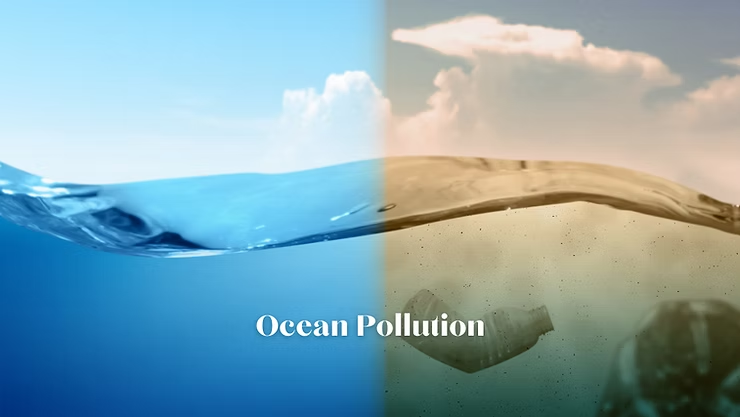Overview
The ocean is vital for life on Earth, yet it faces increasing threats from pollution. Ocean pollution occurs when harmful substances like plastics, chemicals, and waste enter the water through industrial activity, agricultural runoff, or improper disposal. These pollutants endanger marine ecosystems, disrupt biodiversity, and put human health at risk. Addressing this crisis requires global awareness, immediate action, and long-term solutions.
What is Ocean Pollution?
Ocean pollution refers to the contamination of seas with plastics, toxic chemicals, and other harmful waste. It impacts marine life, disrupts ecosystems, and affects communities that rely on the ocean for food and livelihoods. Preventing further pollution is critical to safeguarding both the environment and human well-being.
Causes of Ocean Pollution
Key Sources
- Industrial waste – factories release harmful chemicals and heavy metals into waterways.
- Plastic pollution – single-use plastics accumulate, harming marine species and habitats.
- Oil spills – devastating events that suffocate marine ecosystems.
- Agricultural runoff – pesticides and fertilizers wash into oceans, fueling toxic algal blooms.
These pollutants act like an endless cycle, degrading ecosystems and putting ocean health in jeopardy.
Effects of Ocean Pollution
The consequences of pollution are wide-reaching. Coral reefs die from chemical exposure, marine animals ingest plastics, and food chains are disrupted. For humans, contaminated seafood and exposure to toxic water can cause diseases, while communities face economic and health challenges.
The Impact on Human Health
Contaminated Seafood
Pollutants such as heavy metals and microplastics accumulate in marine organisms, making seafood unsafe. Consuming it can lead to foodborne illnesses, chemical exposure, and long-term health risks for communities dependent on fishing.
Waterborne Diseases
Polluted waters carry bacteria and pathogens responsible for cholera, typhoid, and hepatitis. These diseases spread through direct contact with contaminated water or seafood, stressing the need for sanitation and water treatment improvements.
Toxic Chemical Exposure
Pesticides, industrial waste, and oil residues contaminate oceans, causing neurological disorders, reproductive issues, and skin irritation in humans. Reducing chemical discharge is essential for protecting health and ecosystems.
The Urgency to Save the Ocean
Preserving Marine Biodiversity
Biodiversity ensures ocean resilience, but overfishing, habitat loss, and pollution are pushing species to extinction. Establishing marine protected areas and enforcing sustainable fishing practices can restore balance and safeguard ecosystems.
Protecting Coastal Communities
Coastal populations face rising seas, stronger storms, and direct exposure to pollution. Waste management, sustainable development, and coastal protection measures are vital for their safety and survival.
Sustainable Solutions
Key strategies include reducing single-use plastics, adopting ocean-friendly farming, and encouraging sustainable tourism. Collective change can make oceans healthier for generations to come.
Conclusion
Taking Action Now
- Say no to single-use plastics and embrace reusable alternatives.
- Choose sustainably caught or farmed seafood.
- Join community beach clean-ups and conservation efforts.
Collaboration for Change
Governments, organizations, and individuals must unite, share resources, and promote policies that protect marine ecosystems. Awareness campaigns and education will inspire wider participation in conservation.
A Cleaner Future
With strict regulations, better waste systems, and conscious lifestyle choices, we can create a cleaner ocean. Every action contributes to protecting biodiversity, supporting coastal communities, and securing a healthier planet.
Save Our Blue Ocean continues to raise awareness with eco-friendly bracelets symbolizing turtles, sharks, and whales. By supporting this mission, you help protect marine life while making a positive fashion statement. Visit Save Our Blue Ocean | Ocean Gift Malaysia to explore the collection and join the movement for ocean conservation.

